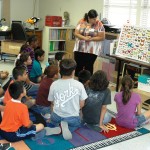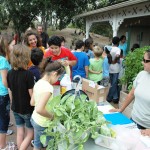“Okay, what’s the difference between a butterfly and a moth?” asked Natalie Cervantes, Texas A&M AgriLife Extension Service youth gardens coordinator for Bexar County, during her recent “Butterflies of the World” presentation to fourth-grade students at Wilshire Elementary School in San Antonio.

Natalie Cervantes with the Youth Gardens Program of the Texas A&M AgriLife Extension Service gives a “Butterflies of the World” presentation to a group of fourth-grade students at Wilshire Elementary in San Antonio.
“Today I’m telling the kids about butterflies and insects and their role in the environment as pollinators,” Cervantes said. “We’re concentrating on native Texas butterflies because those are the ones they’re most likely to see.”
Cervantes was at Wilshire as part of AgriLife Extension’s Youth Gardens Program participation in the school’s Environmental Awareness Day activities. Through its Youth Gardens Program, the Bexar County office of AgriLife Extension, an educational outreach agency of the Texas A&M University System, provides education on gardening, horticulture and water conservation, as well as educational presentations to supplement and enrich classroom science objectives.
Youth Gardens Program education efforts are focused on introducing kids to nature and helping them develop a respect for the environment, said Lupe Landeros, AgriLife Extension director for Bexar County. Program efforts include Classroom Gardens Programs, the Children’s Vegetable Garden program in cooperation with the San Antonio Botanical Gardens, Terrarium Programs, educational camps and special events.
“We want young people to understand the importance of agriculture and being outdoors, as well as know the joy of growing their own food and learning about its nutritional value,” Landeros said. “The programs are primarily at elementary schools, but we also have some in middle and high schools. We offer teacher trainings and a Junior Master Gardener training.”
AgriLife Extension’s youth gardening activities create an environment that brings together parents, educators and the community to educate urban youth, she said. The Youth Gardens Program was made possible in large part due to the support of the San Antonio Livestock Exposition, Inc.
“I’ve been here for more than 23 years and have been involved in classroom gardening for most of that time,” said Donna Kadilis, a special education teacher at Wilshire and member of the Bexar County Master Gardener association, a volunteer horticulture program of AgriLife Extension. “I got my special education students involved in gardening as a way for them to relate to other students and to give them something they would enjoy doing.”
Wilshire now has a butterfly garden and several raised-bed gardens where students grow ornamental flowers and a variety of vegetables. This year, it received a Texas Certified Backyard Habitats designation for non-game and urban wildlife from a joint initiative of the National Wildlife Federation and Texas Parks and Wildlife Department.
“Over the years, we’ve had thousands of kids go through our outdoor-gardening classroom,” Kadilis said. “We’ve grown pumpkins, melons, cucumbers, strawberries, tomatoes, broccoli, peppers, cabbage, potatoes and more. “The kids love to plant the seeds or seedlings and then cover them with soil and watch them grow. They also enjoy picking the vegetables when they’re ready, and they’re always anxious to eat them.”
Kadilis said AgriLife Extension has helped by providing children’s gardening tools, plants and other materials for the gardens, as well as valuable gardening advice.
“Besides that, Mike Shockey with their 4-H program has brought his ‘City Critters’ wildlife module to my classes to introduce the kids to urban wildlife,” she added. “And other people from the agency, like Natalie, come to the school to present educational programs about nature.”

Teachers learn from the Junior Master Gardener curriculum to to get students involved in gardening, science, math and other subjects.
David Rodriguez, AgriLife Extension horticulturist for Bexar County, said AgriLife Extension conducts spring and fall teacher trainings for educators interested in installing a school garden and using gardening as a teaching tool. The agency also conducts Junior Master Gardener adult training once a year during the summer, focusing on the Junior Master Gardener curriculum.
This past year, the Classroom Gardens Program alone had 278 teachers representing more than 50 schools throughout Bexar County participate, plus more than 5,200 students.
The training focuses on the Junior Master Gardener curriculum, which is targeted at third- to fifth-grade students. Activities are correlated to the Texas standards in math, science, language arts and social studies.
“But teachers of younger students can easily adapt the curriculum for their age group,” Rodriguez said, adding that the next training will take place July 23-25 at the San Antonio Botanical Garden.
He said research shows that school children involved in gardening and using the Junior Master Gardener curriculum improve their science scores and math skills, plus expand their vocabulary.
Ninfa Salinas, a teacher at Northwood Elementary, was among the more than 175 teachers who participated in last year’s teacher trainings.
“I was like a kid in elementary school myself, listening to the gardening experts at the training and soaking in all they said,” Salinas recounted. “It’s critical that kids realize just how vital food production is — and where their food comes from. As a teacher, I feel I was given everything I needed to succeed with the program – from information to the plants themselves.”
Another popular Youth Gardens Program, the Children’s Vegetable Garden Program, is conducted in cooperation with the San Antonio Botanical Gardens. Held for several weeks in the spring and fall, the program gives children 8-13 years old the opportunity to grow their own vegetables.
“With the help of Bexar County Master Gardener volunteers, each child plants their own plot in the garden,” Rodriguez said. “Children grow different types of herbs, vegetables, and ornamental annual flowers. And weekly educational gardening presentations stimulate their minds as they participate in fun, hands-on Junior Master Gardener activities.”

Youth at the Children’s Vegetable Garden Program, presented in cooperation with the San Antonio Botanical Gardens, grow, harvest and show vegetables grown on their own plots.
Rodriguez added that the next Children’s Vegetable Garden program will take place over 16 Saturdays from late August to early December.
Katherine Sickle, a teacher at Beacon Hill Elementary, has been involved in both the classroom garden and terrarium programs.
“Our gardens are targeted at third graders, but any student from kindergarten through fifth grade can participate,” Sickle said. “Gardening helps us supplement their life science and earth science education. We’ve had hundreds of kids participate in the program.”
She said students also learn how to make their own terrariums, which helps teach them about plants, nature and the water cycle.
“The kids are very careful when planting their airplane plants and purple hearts in the plastic containers,” she said. “The process helps them learn about natural resources, and the terrariums teach them about condensation and the water cycle. These programs are a great way to get kids interested in nature and in science.”
Other Youth Gardens Program offerings through the AgriLife Extension office in Bexar County include a youth speakers bureau, educational camps and special events.
For more information, contact Rodriguez or Cervantes at 210-467-6575 or go to http://www.bexaryouthgardens.com/.

 .
.